Today Wahoo announced their latest device – the Wahoo TICKR FIT. The TICKR FIT is simply an optical heart rate sensor that transmits ANT+ & Bluetooth Smart. Basically, it’s like a Scosche Rhythm+ or to a slightly lesser extent like a Polar OH1 sensor. All three of which are generally designed to be worn on the upper arm, which has the benefit of generally giving quite a bit more accurate readings than optical HR sensors worn at the wrist.
In any event, this $79 sensor is priced identical to that of the Scosche Rhythm+ as well as the Polar OH1. I’ll get into the nuanced competitive differences down below though, as there are some things worth noting.
Before we go too far, note that Wahoo sent me a TICKR FIT to try out. As usual, I’ll send it back to them once I’ve wrapped up this review – likely even next week in person at CES. The TICKR FIT is available for purchase today (and should be shipping out today too). If you find this review useful, hit up the links at the bottom for all your sports gadgetry purchases (or, just to buy toilet paper on Amazon…your choice).
Actually, wait, one more thing! If you just wanna watch a video that summarizes this entire review from start to finish (with a few extras actually!), then here ya go:

With that, let’s begin!
Unboxing:
The box the TICKR FIT comes in isn’t all that much different than that of the existing TICKR lineup of chest HR straps. You’ll find the side pops open, allowing you to slide a small tray out:
Inside you’ll find a handful of items, packaged up as seen below:
These items are:
1) TICKR FIT sensor pod
2) Long strap
3) Short strap
4) Charging dock
5) Quick start guide
6) Legal paper junk
Starting with the charging dock, you’ll see it has two tiny pins for charging, which connect to the underside of the TICKR FIT pod. There are magnets in the charger to assist in keeping it put.
Meanwhile, looking at the pod itself, it’s got a singular blue button on the side of it, which is used for powering it on/off.
On the bottom is the optical HR sensor itself, along with some logos including ANT+, Bluetooth Smart, and various other bits of goodness.
The two straps I’ll get into in a moment, but basically if you’re a smaller individual, then you’ll likely use the small one, or bigger folks can use the longer one.
Then finally, there’s the quick start guide, which as you’ll see down below, is pretty simple:
Oh, and the legal junk:
As usual, it basically says if you kill yourself, it’s likely because you did something stupid and it’s probably your fault. And in fairness, that’s probably true.
The Basics:
Like my other HR sensor posts, I’m going to attempt to keep this fairly simple, because at the end of the day…it’s a fairly simple sensor. At present it just transmits your HR, and that’s it. Unlike some of the other sensors on the market, they aren’t doing any offline recording of workouts currently, nor transmission of things like running cadence, or anything else. Just HR for now. Perhaps that’ll change. Perhaps not. Perhaps it’ll stop raining here today, but probably not.
In any case, to begin, you’ll slide the strap through it. The first time I did it wrong, it shouldn’t cover the device. Instead, it’s designed to unstrap each time you use the device. The end result should be like this:
As noted above, there’s both a long and a short strap. For me, either strap would actually work. The best placement is on your upper arm, around your bicep. This is basically an identical spot to that of the Scosche Rhythm+ or Polar OH-1. The appeal to this specific location is that it’s got a lot of ‘meat’, compared to say your wrist bone. As such, you tend to get really good readings from it.
Once all that’s done, you’ll turn on the unit by holding down the blue button for a couple seconds. Unlike the Scosche, it doesn’t accidentally turn on easily, so you don’t have to worry about transit issues.
When you turn it on, you’ll see a status LED illuminated atop it. And then below it, you’ll see the green LEDs of the optical HR sensor light up.
Wahoo has developed their own optical HR sensor package here (using off the shelf components of course), but hasn’t gone with another vendor like Valencell or others. While Wahoo didn’t specify on why they rolled their own, I suspect it’s the same reason as most others are shying away from Valencell these days: Battery life. While Valencell has great accuracy, the battery life aspects are harder and harder to swallow for companies, especially those that may have plans to let the sensor run for extended periods of time (i.e. days).
Of course, if the sensor isn’t accurate, then all the battery life in the world won’t matter. But fear not, I’ll dive into accuracy in just a moment.
With the unit turned on and transmitting, it’s time to pair it up to your device of choice. The unit transmits on the standard heart rate device profiles for both ANT+ & Bluetooth Smart. For example, if you’ve got a Garmin device, you’ll generally connect to the TICKR FIT on ANT+ (though, Garmin’s 2017 devices now support Bluetooth Smart sensors, so you can use that too). Here it is pairing to a Garmin FR935 via ANT+:
Concurrently, the device also transmits HR on Bluetooth Smart, so if you’ve got something like a Suunto or Polar device, you’ll connect via Bluetooth Smart. This is also true of most apps, like Zwift on iOS. Here I’m paired via Bluetooth Smart on Zwift with an iPad:
And of course, if you’ve got a Wahoo device (ELEMNT/ELEMNT BOLT), you can connect on either ANT+ or Bluetooth Smart.
In my testing thus far, I’ve successfully connected with the following devices:
Garmin FR935 (via ANT+)
Garmin Edge 1030 (via ANT+)
Onelap PC app (via ANT+)
Suunto Spartan Trainer (via Bluetooth Smart)
Wahoo ELEMNT
Wahoo Fitness App (via Bluetooth Smart)
Zwift iOS (via Bluetooth Smart)
Note that while the unit does transmit RR/HRV interval data as required by the ANT+ spec, it shouldn’t be considered too accurate during workouts. No optical HR sensor on the market today is able to do so well during workouts, though most can just fine at rest.
Given that the ANT+ & Bluetooth Smart heart rate profiles are the most well defined of either spec, I don’t expect any unforeseen compatibility issues with this sensor. I can’t remember the last time I heard of any current device/app/sensor screwing up compatibility on either of the ANT+ or BLE heart rate profiles.
The unit claims 30 hours of battery, and while I haven’t done 30 hours of use with it straight (I’ve charged it a few times here and there before it got to the end of battery life), so far I’ve never run out of battery. This battery life is about triple that of the Scosche Rhythm+, which is quite a jump, especially for those doing longer activities like ultras. As noted above, charging is done via the small charging dock/connector:
With that, let’s dive into the accuracy pieces.
Heart Rate Accuracy:
The single most important aspect of a heart rate sensor is whether or not it’s accurate. After all, there’s little point in buying one if it’s not accurate. As noted above, Wahoo selected to roll their own sensor package here, which means they’re pulling off the shelf components together (optical sensor, LED’s, etc…) to form a ‘sensor package’. Most manufacturers do this, be it Garmin, Polar, Fitbit, or others. Some, such as Suunto, have leveraged 3rd parties with well-established histories, such as Valencell, for constructing their optical HR sensor packages.
If I looked back 2-3 years ago, I’d have said that going with an established entity like Valencell or (at the time) Mio or LifeQ would have made sense. Those companies understood the complexities well. But in the last couple years, that knowledge has become more mainstream, and there’s less and less reason to outsource it (both from a cost standpoint, as well as speed to market). Further, using Valencell sensor packages isn’t actually a guarantee of a perfect device. As they themselves will tell you – it’s all about the watch/device the sensor is going into. Suunto is a great example where using the exact same sensor in two different watches has resulted in two different accuracy levels (primarily due to watch weight/balance).
Before we move on to the test results, note that optical HR sensor accuracy is rather varied from individual to individual. Aspects such as skin color, hair density, and position can impact accuracy. Position, and how the band is worn, are *the most important* pieces. A unit with an optical HR sensor should be snug. It doesn’t need to leave marks, but you shouldn’t be able to slide a finger under the band (at least during workouts). You can wear it a tiny bit looser the rest of the day.
Ok, so in my testing, I simply use the watch throughout my normal workouts. Those workouts include a wide variety of intensities and conditions, making them great for accuracy testing. I’ve got steady runs, interval workouts on both bike and running, as well as tempo runs and rides.
For each test, I’m wearing additional devices, usually 3-4 in total, which capture data from other sensors. Typically I’d wear a chest strap (for these tests a Polar H7, a PowerCal HR strap, and a Garmin HRM-RUN, among others), as well as another optical HR sensor watch on the other wrist (many models during this testing period). Note that the numbers you see in the upper right corner are *not* the averages, but rather just the exact point my mouse is sitting over. Note all this data is analyzed using the DCR Analyzer, details here.
First, we’ve got a run from just two days ago, an interval run. These are often the most difficult runs to track, as the rapidly shifting HR requires a device to separate increased cadence from increased HR (the most common error that optical HR sensors make is to ‘lock-on’ to your running cadence). This file set includes the TICKR FIT paired to a FR935, a Suunto Spartan Trainer paired to a Polar H7, and a Samsung Gear Sport. You can look/download the files here in the DCR Analyzer. Here’s the overview.
This set is fascinating because it demonstrates right away the benefits of optical HR sensors – which is on cool/dry/windy days where chest straps can often produce inaccurate results in those first few minutes due to lack of moisture (despite me wetting it). In this case the TICKR FIT properly captures my build, whereas the Polar H7 chest strap doesn’t lock until about 2-3 minutes in.
After that point, we see awesome correlation between the Polar H7 and the TICKR FIT. The Samsung Gear Sport is…well…horrendous. In fact, I excluded it because it’s so bad. It plotted exactly two points of HR data. And lost the plot the remainder of the time.
The only differences we see are in that 5th interval. My suspicion there though may be due to me taking a handful of pictures there, which may have impacted cadence (holding up my arm) and in turn any error correction the unit is trying to do. So I’m less inclined to give it too much grief on that one.
Looking at the sprints at the end, these are 30-seconds long and produce some quick shifts in heart rate. We see the units are very close together there, though the TICKR FIT does seem to slightly undercut the peak heart rate values on the 3rd one especially, but also slightly on the 1st and 4th ones. I suspect had these lasted 40-50 seconds, it would have caught up, as this type of slight undercutting in sprint scenarios is somewhat common for optical HR sensors.
Overall though, camera work aside, this is mostly a good run for the TICKR FIT.
Next, let’s go to another run, this one a bit more steady, though with slight changes in pace here and there. Here’s the data sets for that.
In this comparison against the Polar H7, you’ll see things look pretty good across the board. I see some slight differences on some of the sprints towards the end, as well as a few other acceleration points, whereby the TICKR FIT doesn’t quite reach the same max HR values. In cross-referencing against a third data source I can publish next week, I’d say the Polar H7 is the correct value here for those peaks.
Switching gears, here’s an indoor trainer workout (cycling) while doing Zwift. In this case, I had a PowerTap PowerCal chest heart rate strap and a Garmin FR935 optical HR sensor. Here’s the data set.
You can see that by and large things are nearly identical. I see some very slight (like 1-3 second) differences in terms of delays, but nothing major there. It’s somewhat common for straps to differ slightly from a smoothing/transmission standpoint.
The only time anyone differs here is the FR935 optical HR sensor in 2-3 spots. I don’t know why. But otherwise, everything else in the set looks good, even the sprints you see match up (again, albeit very slightly delayed).
And then finally, an outdoor ride. This started with typical stop and go as I headed across town, followed by a few sustained intensity loops around a large park, and then I headed back across town with a few photo stops. Here’s the DCR Analyzer files for that.
I had a few sensors along for the ride. This included the Gear Sport again, but that data was horribly useless, so I’ll skip it. And then some other stuff I’ll talk about next week. Leaving me with the chest strap (ANT+ PowerTap PowerCal) and the TICKR FIT.
Looking at things, it’s kind of a mixed bag. At the very beginning, the chest strap gets it wrong, as my initial start was more subdued than it makes it seem. Below is the zoomed in section. But after about 3 minutes the two match fairly well, minus a few quirks here and there.
Still, the TICKR FIT definitely made some mistakes. For example, this sprint section below, which is an 800w sustained sprint, the TICKR FIT totally missed the ball.
Yet inversely, later on it nailed a near identical sprint at the same intensity, correctly identifying it, whereas the chest HR strap did some weird dance or something right before the sprint.
The remainder of the ride it was mostly pretty good, except this oddity where I got back on my bike after taking some photos. It totally lost the plot here for a while, seemingly tracking…well…I’m not sure what. The chest strap is easily correct here.
So overall I’d say it does fairly well in running and indoor cycling, but seems to have some quirks in outdoor cycling still. Of course, so do most wrist based optical HR sensors (outdoor cycling). But then again, this isn’t a wrist based one – rather more of an arm based one, and my testing (and many other people’s) has shown that both the Polar OH-1 and Scosche Rhythm+ tend to do fairly well in outdoor cycling with arm placement. So at present, that’s something to consider if you’re looking to do cycling outdoors.
(Note: All of the charts in these accuracy sections were created using the DCR Analyzer tool. It allows you to compare power meters/trainers, heart rate, cadence, speed/pace, GPS tracks and plenty more. You can use it as well for your own gadget comparisons, more details here.)
Competitive Differences:
I’ve added the Wahoo TICKR FIT into the product comparison database for heart rate sensors. This includes other standalone optical HR sensors like the Polar OH-1 and Scosche Rhythm+, as well as non-optical HR sensors such as the Wahoo TICKR/TICKR X and Garmin/Polar/4iiii/etc chest straps.
For the purposes of comparison below, I’ve put the three standalone optical HR sensors side by side, but you can mix and match your own comparison here within the product comparison tool.
| Function/Feature | Wahoo TICKR FIT | Scosche RHYTHM+ | Polar OH1 |
|---|---|---|---|
| Copyright DC Rainmaker - Updated July 27th, 2023 @ 10:46 am New Window | |||
| Price | $79 | $79 | $79 |
| Product Announce Date | Jan 3rd, 2018 | Jan 6th, 2014 | Aug 30th, 2017 |
| Product Availability Date | Jan 3rd, 2018 | Early May 2014 | Late Sept 2017 |
| Measurement Type | Optical | Optical | Optical HR |
| Typical Placement | Mid/Upper Arm | Mid/Upper Arm | Upper Arm |
| Battery Life | 30 hours | 7-8 hours | 12 hours |
| Battery Type | USB rechargeable | USB rechargeable | USB Rechargeable |
| NFC Capable | No | No | HR Transmission | Wahoo TICKR FIT | Scosche RHYTHM+ | Polar OH1 |
| ANT+ | Yes | Yes | Yes (with firmware update) |
| Bluetooth Smart | Yes | Yes | Yes |
| Dual concurrent ANT+/BLE | Yes | Yes | No |
| Analog for gym equipment | No | No | No |
| Usable HR data underwater | Depends: If on same wrist, YMMV. | Depends: If on same wrist, YMMV. | No |
| Bridging ANT+ to Bluetooth Smart | No | No | No |
| Can record activity in memory | No | No | Yes | Additional Data | Wahoo TICKR FIT | Scosche RHYTHM+ | Polar OH1 |
| Run Pace | No | Yes (firmware 3.01 and above) | No |
| Run Cadence | No | Yes (firmware 3.01 and above) | No |
| Run Economy/Metrics | No | No | No |
| Cycling Cadence | No | ||
| Cycling Power Meter Estimation | No | No | No |
| Valid HRV/RR data | No | No | No |
| Configurable Sport Modes | No | No | |
| Displays HR Zones | No | No | |
| Requires Bluetooth Smart Phone for Configuration | No | No | No |
| Firmware Updateable | Yes | Yes for newish units | Yes |
| SDK For App Developers | No | App | Wahoo TICKR FIT | Scosche RHYTHM+ | Polar OH1 |
| Can show workout afterwards | N/A (No recording) | Yes | |
| Can sync files/workout to 3rd party | N/A (No recording) | Yes | |
| More Info | Link | Link | Link | Purchase | Wahoo TICKR FIT | Scosche RHYTHM+ | Polar OH1 |
| Amazon | Link | Link | Link |
| Backcountry.com | Link | ||
| Competitive Cyclist | Link | ||
| REI | Link | ||
And again, remember, you can mix and match any of the sensors you want here within the product comparison tool, in case you want to see how things measure up to other chest sensors.
Summary:
It was probably only inevitable that Wahoo would get into the optical HR sensor game. After all, they were the first company to produce and ship a Bluetooth Smart HR chest strap many years ago (6 years ago tomorrow in fact), and they’ve also been on the forefront of producing ANT+ and other dual sensors as well. So the lack of an optical HR sensor in their lineup was a bit of an odd omission.
In many ways, I suspect the TICKR FIT may be testing grounds for other products or features down the road. Even the device itself is actually a bit sparse compared to the Scosche or Polar offerings, which have more features like speed/cadence functionality as well as storage. Heck, it’s even more sparse than Wahoo’s own chest offerings. Wahoo declined to say what additional hardware may be inside the TICKR FIT, but it’d be odd to me if it didn’t at least match the hardware of the TICKR series (which has accelerometers and storage in it).
As for whether it’s worth buying? Hmm, I’d kinda give it a ‘sure/meh’. There’s nothing inherently wrong with it (aside from some minor quirks I’m sure they’ll soon sort out), but there’s also nothing inherently amazing about it either…unless you truly need 30-hour battery life. It lacks the really strong accuracy of the Scosche Rhythm+ across multiple sports, while also lacking some of the added features of the OH-1 and Rhythm+. If Wahoo were to implement such features, it’d be a very different ball game.
Still, if one landed on your doorstep, it’s nothing to be disappointed about.
With that – thanks for reading!
Found this review useful? Support the Site!
Found This Post Useful? Support The Site!
Hopefully you found this review/post useful. At the end of the day, I’m an athlete just like you looking for the most detail possible on a new purchase – so my review is written from the standpoint of how I used the device. The reviews generally take a lot of hours to put together, so it’s a fair bit of work (and labor of love). As you probably noticed by looking below, I also take time to answer all the questions posted in the comments – and there’s quite a bit of detail in there as well.
If you're shopping for the Wahoo TICKR FIT or any other accessory items, please consider using the affiliate links below! As an Amazon Associate I earn from qualifying purchases. It doesn’t cost you anything extra, but your purchases help support this website a lot.
And of course – you can always sign-up to be a DCR Supporter! That gets you an ad-free DCR, access to the DCR Shed Talkin' video series packed with behind the scenes tidbits...and it also makes you awesome. And being awesome is what it’s all about!
Thanks for reading! And as always, feel free to post comments or questions in the comments section below, I’ll be happy to try and answer them as quickly as possible. And lastly, if you felt this review was useful – I always appreciate feedback in the comments below. Thanks!





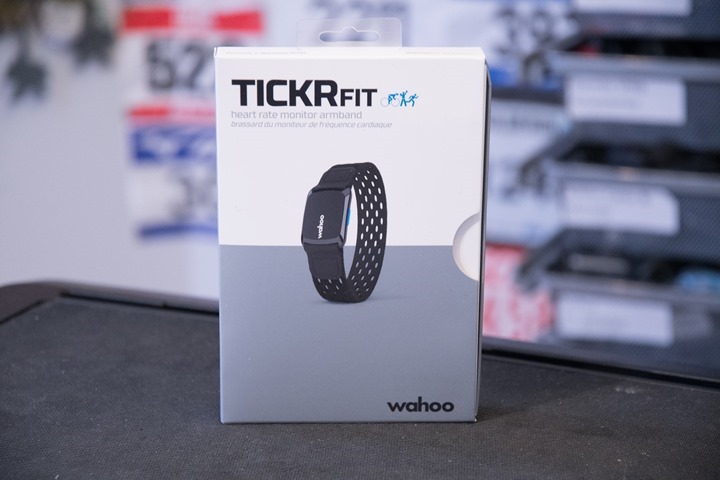
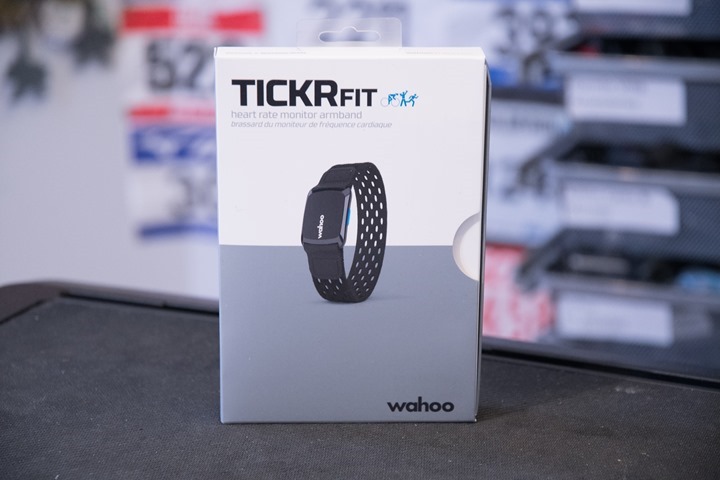
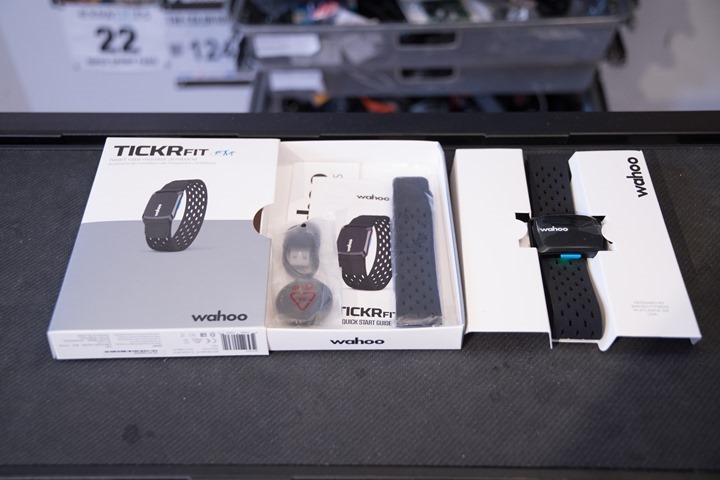
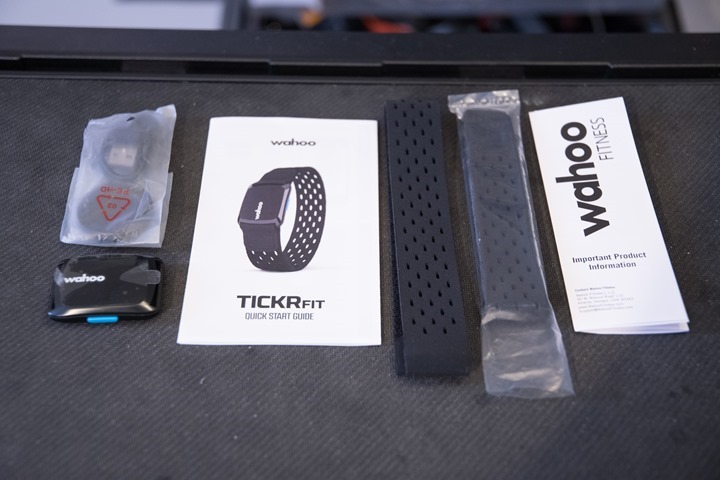
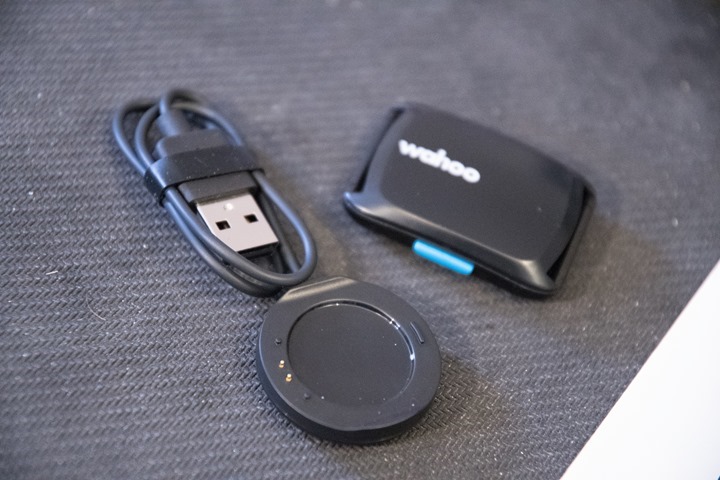
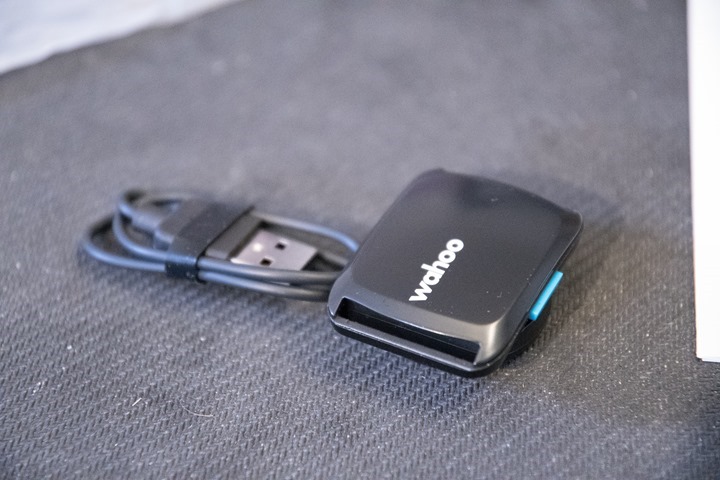
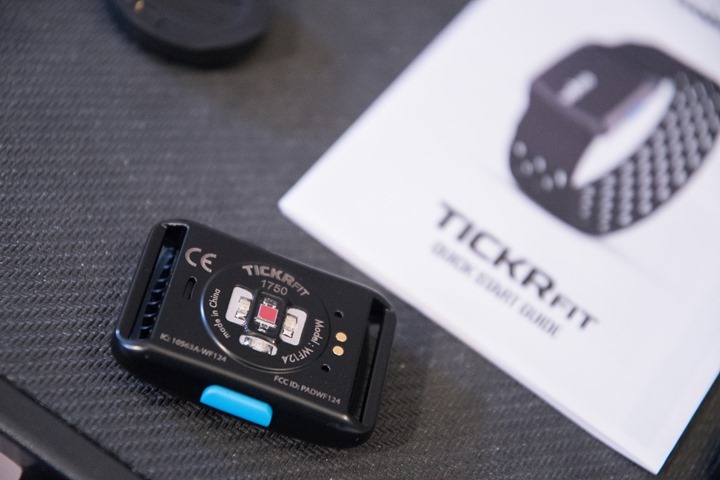
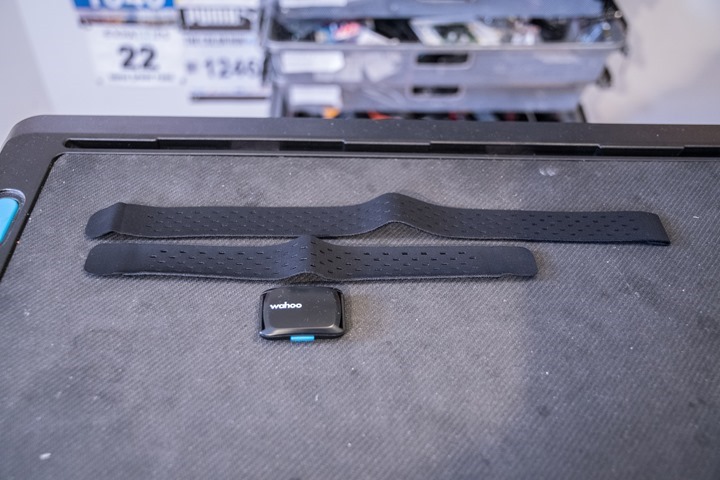
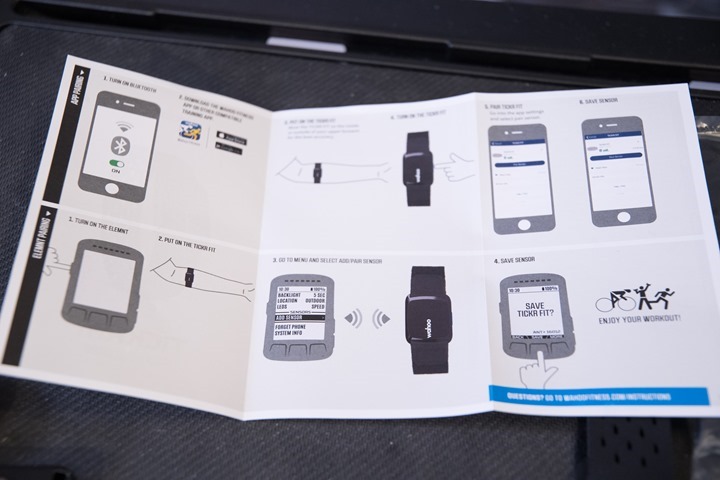
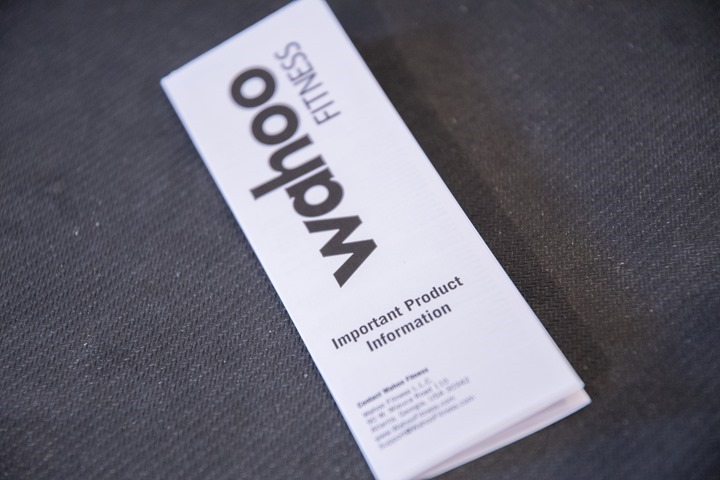
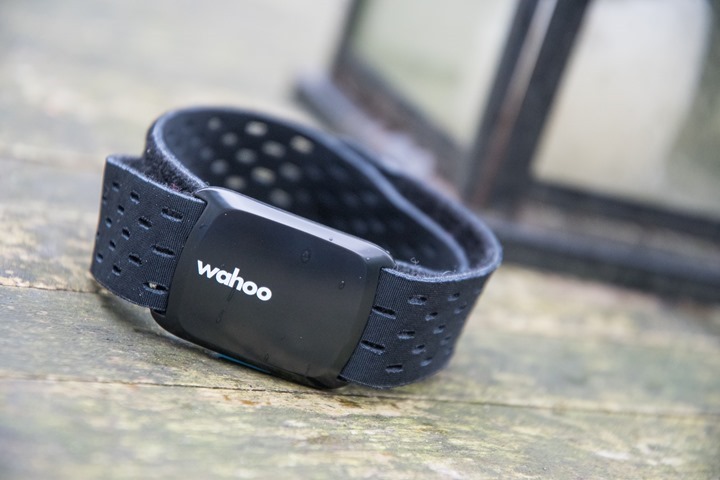
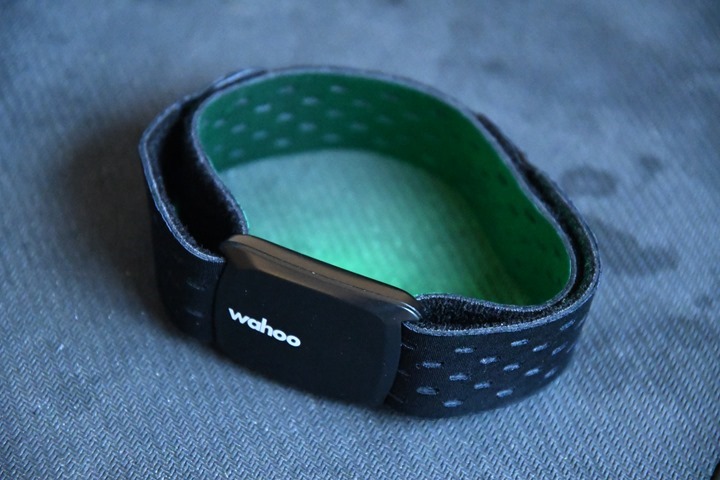
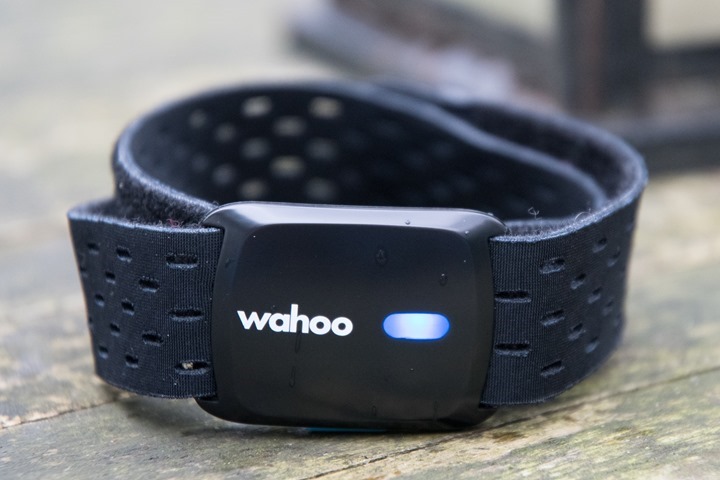
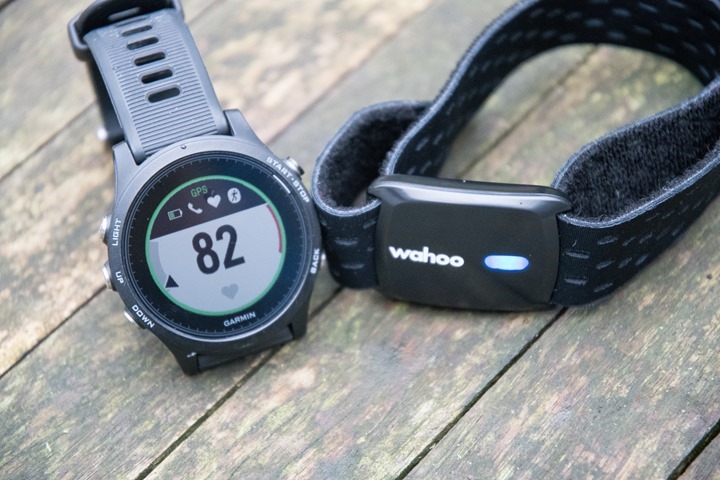
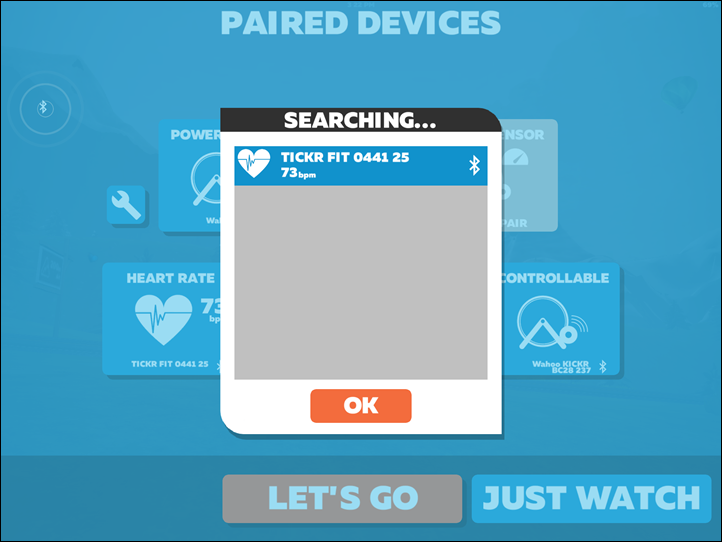
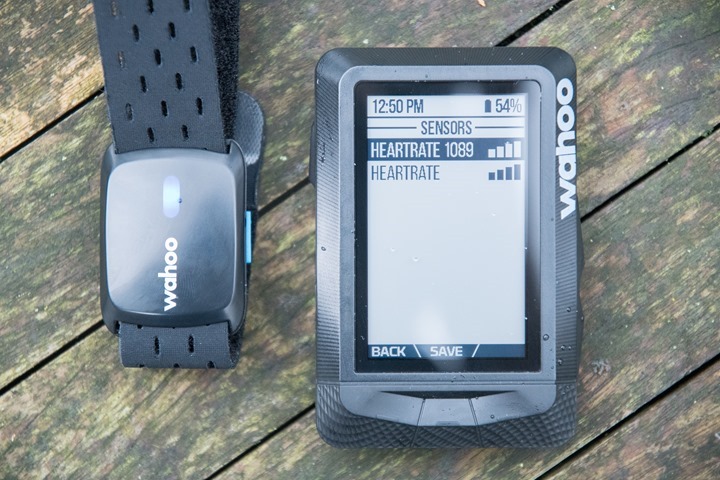
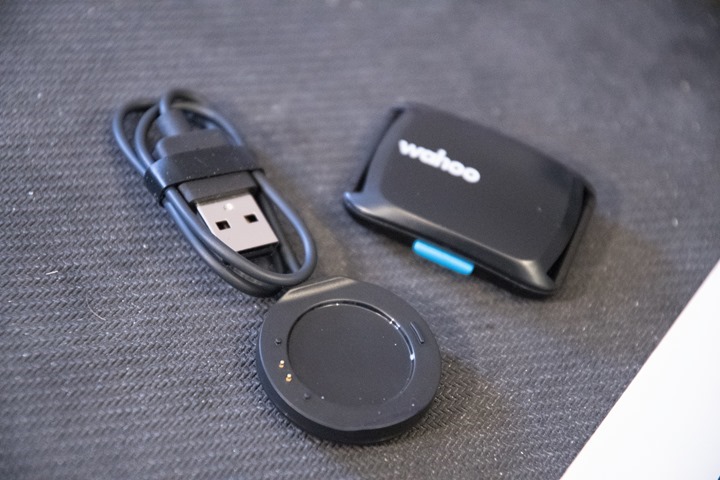
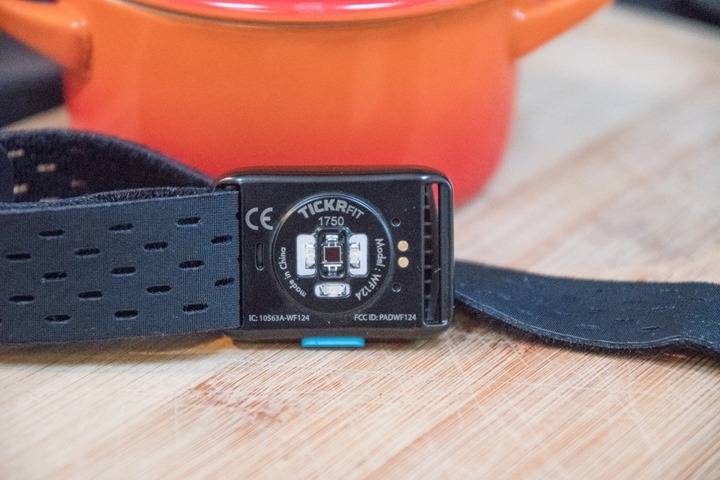
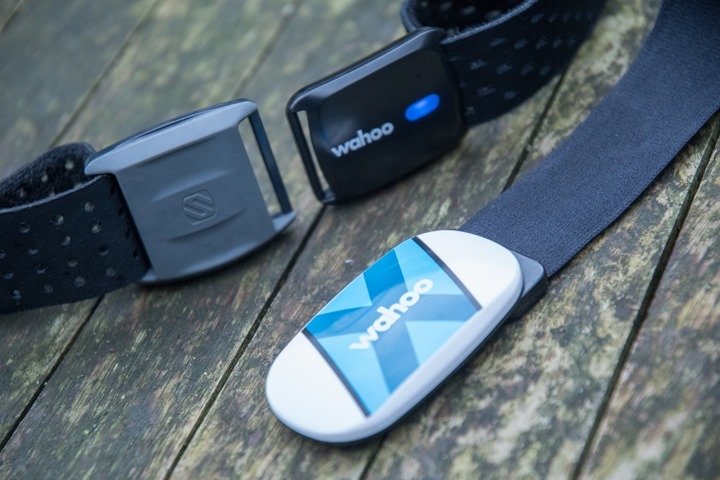












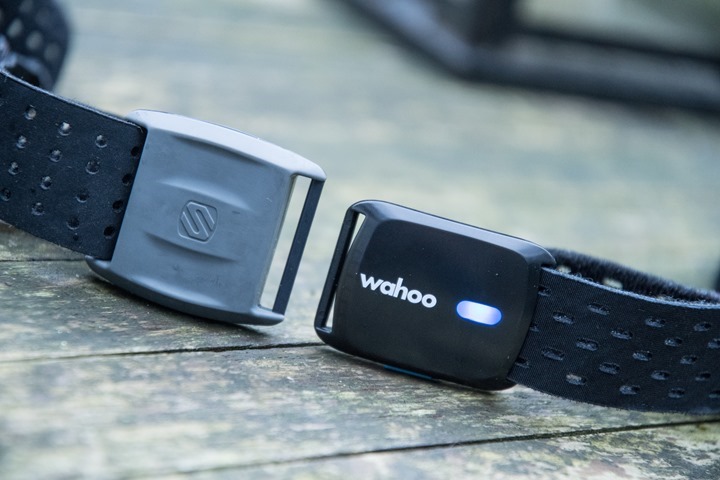
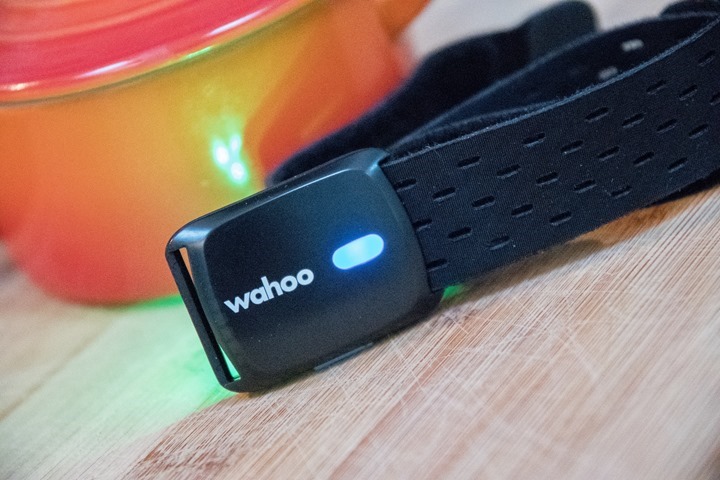
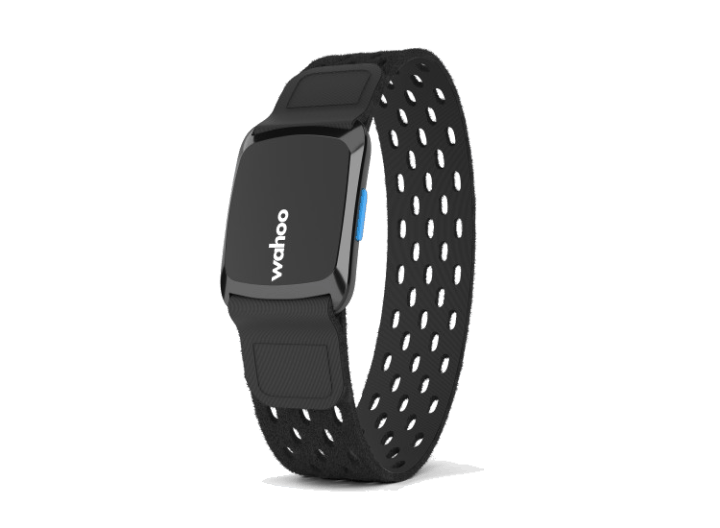
















Does the status LED give you any information about current charge levels when you turn it on or while using it (say 2 blinks means 50%, 4 blinks means 100%)? Not having any way to figure out what the charge level is has been my main issue with the Rhythm+ and it would be interesting to know if Wahoo improved on this.
yeah theres an explanation of all led colors and blinks including a 15% warning that i havent gotten to yet in 2 weeks of use
link to wahoofitness.com
In comparison to the polar h7 chart, are we sure that you were not having a slightly non perfusing rhythm (Pvc’s or PAC;’s) since the measurement of the devices is different (electrical activity vs perfusion)
Historically speaking, I haven’t ever seen any appreciable difference between using optical vs chest measurement when it comes to workouts. The best sensors on the market when compared act virtually identical.
Mack – my guess is that Ray would notice that skipped-a-beat feeling if his heart was doing the premature contraction lambada.
I do like the battery life and would be on board with this if it was a bridge. RIght now i’m using my Viiiiva to hook my garmin footpod into Zwift on my ipad, but would much prefer a wrist/forearm based HRM.
I’m sick of charging stuff, I would rather have a CR2032 that lasts a year rather than having to charge this once a week
Yeah, the battery draw of optical HR sensors is far too great for coin cell batteries unfortunately. The good news is chest straps still have plenty of options with CR2032 batteries.
This is rather timely!
Having inadvertently upgraded the firmware on my Scosche Rhythm+ to 3.01, it’s now completely useless. Although not as useless as the Scosche website when it comes to any kind of support whatsoever about the device or firmware.
I can’t see any way to downgrade it back to the old firmware, and there is no upgrade in sight for a working FW.
I’ve purchased a Vivoactive 3 (through the site) but the OHR is appalling on it! So this could well be the new favourite.
link to scosche.com
I’ve contacted them twice. No reply. Contacted them on Facebook, and they told me to contact Clever Training Europe.
I did the same thing a year or so ago, whined to Scosche, and they replaced my unit. Get online and try to use the chat feature.
Hi Ray,
sorry for off-topic: I have a question for you which is not about WAHOO TICKR FIT. It’s about SCOSCHE RHYTHM+.
Do you know if it’s possible update firmware via Android phones or another method which don’t implies iOS?
Because I have a Rhythm+ and I own an Android phone and on their site, it’s not mentioned. Also, they don’t respond to messages send from their contact page therefore it’s difficult to find out a method to update firmware in those conditions.
And starting from here I think that is useful to insert in your articles those kind of information – about future updates of firmware’s or about how easy or documented are updates :)
With Garmin, Fitbit or Suunto for example it’s very easy, but with other devices it’s tricky or almost impossible or very hard to accomplish a firmware update.
Thanks!
I wouldn’t.
I upgraded my Rhythm+ to 3.01, and have had nothing but issues with it. It appears to be a problem. Searching online, a few people are looking to downgrade back to 2.5, but can’t see how.
When I last spoke to Scosche about updating the firmware on your Rhythm+ they told me that the older Rhythms, I think it was firmware version 1.0 are not upgradeable and had to be returned to the factory to have the firmware upgrade. They told me I had to pay shipping back to Scosche and they would pay shipping back to me. I got a hold of them through live chat. Not sure if that helps at all …
I checked again and this is the correct answer ” Prior to firmware V2.5, the Rhythm+ had to be sent back to Scosche for firmware updates.” Mine is 2.2 so not upgradeable. You can see your version of firmware using the Scosche app.
Ray can only write about firmware upgradability if it was possible at time of release, otherwise it will be up to the readers (or I guess Ray himself) to post about future changes in the comments section. I bought my Scosche Rhythm+ years ago when it was first released and since I never had any issues with it except the power button being way too sensitive, so I didn’t even know there were firmware upgrades for later revisions until recently.
Very interesting. I clearly hesitate between him and the Scosche one.
Is there a new Scosche unit planned soon ?
Table for “firmware upgradable” is wrong for the rhythm+ as it can be upgraded.
Would I be right in thinking the new tickr fit is compatible with the element mini, unlike third party? This does make that seem a lot more interesting than before actually.
Thanks, fixed. It initially wasn’t actually upgradeable, so hadn’t updated that row. Thanks!
It should be compatible with the Mini, though I haven’t tried that combo.
Version 2.5 and later can be updated by the user
I have android and I can’t find a way to upgrade the firmware.
Thanks for the overview. That’s a clear no for me as I mostly ride outdoors. I’ll stick to the Tickr strap
To clarify, which of the Suunto devices you mention are you saying are accurate OHR vs inaccurate OHR using the same device?
I see the Spartan Trainer as more accurate than the Sport edition, which I believe is primarily due to weight of the heavier watches introducing bounce.
To my opinion the accuracy is tightly associated with the user and the kind of sport. The Fr935 still gives me erratic reading, cutting crest in interval running or playing squash. It is great for biking or indoor rowing.. The spartan Sport whr is the only one I have been successfuly used for squash. No success with any other OHR for squash.
I’ve owned a Scosche Rhythm+ for a number of years thanks to your review and recommendation. I use it with my original Garmin Vivoactive. I was not aware of the 3.01 firmware update. I thought the device was not capable of having the firmware updated. What is the process to update the firmware and do you recommend the update? Thank you.
Yeah, the 3.0.1 update snuck out fairly recently (like, last week or so I think). I’m not sure if the super early units can be updated or not. I’ve gotta try it on mine later today.
No, those first units are not upgradable (the ones that came with version 1 or so). You have to send them back to Scosche so they can update it for you. If the sensor is on FW 2 point something then it’s possible.
hello,
3.0.1 came out last summer already.
i upgraded in september after looking out for some weeks/months to see if the new firmware broke the device, since V3.0.0 bricked a lot of devices. (a lot of reports on the page I mention below).
It turns out that V3.0.1 also causes high spike readings, especially making HR readings in apps like iSmoothRun crash (you get like 12.000 as heart rate until your run stops).
I have posted all the info + the workaround for iSmoothRun on the Scosche page: link to dcrainmaker.com
All credits for the workaround to the quick response of the creators of the app, because from Scosche there was complete silence unfortunately.
However, not sure if the bug has been fixed in newer versions of iSmoothRun.
The bug didn’t appear in the Wahoo app.
I’d love to see a side by side comparison of the scosche/TICKR FIT and see how they stack up against each other. I’ve had a Rhytm+ for a while but in mountain biking don’t find it accurate enough for zone based training and went to a TICKR chest strap. Any idea if this can do HRV measurements for something like EliteHRV? I’d love to see you do an article on HRV Ray …
Saying battery life of Valencell is bad doesn’t make sense. The Scorche is how old now? Sure its a great device that works but you would think the hardware used in it could be improved and use less battery power.
Guessing the scorche uses:
link to valencell.com
But the new version is:
link to valencell.com
So 2.548 mA vs 5.24 mA so a modern version of the scorche could have around twice the battery life using the same high precision mode. If standard precision was good enough 2.318 mA vs 0.522 mA, a much bigger gap
Even twice the battery life is unsustainable for most wearable makers. Keep in mind Garmin/Fitbit/Polar/Apple/etc are doing 5-7 days (min) with optical on ranging from 1s to every few minutes.
Every manuf I’ve talked to has stated the exact same thing as a leading reason they can’t use the Valencell stuff these days: Battery life.
Hey, your Scosche Rhythm 24 Optical HR Band hands on kind of confirms what I said :-p
Ray,
I got my wife’s hand me down Scosche’s Rhythm, and for me, the HR reading is pretty bad – reads low, seems to lock on indoor cycling cadence frequently, etc. I’ve tried using it on both my forearm and upper arm, and neither seems to make a difference. I don’t have dark / tanned skin (not much sun in the Bay Area). Any ideas? Or any idea if either the Wahoo Fit or Polar OH-1 would work?
I’m in the Bay Area and have somewhat light skin. I used the Rhythm+ with great success for a couple of years until the 3.x firmware update made it, well, unreliable. I now have the OH1 and it works fantastic.
Hum. I love everything about my Scosche accept for the battery life. (oh, and then band is now worn out and the velcro doesn’t always stay attached).
I get about 6 hours out of it (granted it’s now 2 years old)….which sounds like plenty for most activities, but I start the Scosche so it connects to my fenix 3 and edge 1000….then I muck around with getting my bike ready…..or finding where the dog hid my socks etc. Then I do a mid ride 45 minute coffee stop and then that all add up to no heart rate data for the last hour of my long ride days.
This is tempting looking at the battery life.
New bands are like $13. My band lasted for something like 4 years before needing replaced (and I’m still getting 6-8 hours of life on the battery.)
This looks excellent. I recently swapped my Rythmn+ for an OH1, but that has started to lock onto cadence or freeze on a particular HR – even when fully warmed up. In a recent marathon, for example, I had to walk to negotiate a flood due to a burst river. Immediately after this, the OH1 sat on the same HR for the next mile – I didnt notice. It was then a PITA to move/reset it under a few layers of clothes and wearing gloves! Not what you want 18 miles in! The strap on the OH1 is just too thin also – and it flips when I’m trying to get a base layer over my arm.
Looks like I’ll be sending that back to amazon and giving the TICKR FIT a go instead – zero cost to me.
Also intrigued to see what else is under the hood.. time will tell, although I dont need on-device recording etc.
Oh, and the strap looks very similar to the Rythmn+. I put together a custom elastic band for that so it just slipped over my arm and was a consistent fit. Seems the obvious things to try with the TICKR, and but isnt possible with the OH1 without physically cutting the original strap off.
Yeah, the strap on the OH-1 is sorta the minor annoyance there. In some ways, they made too small a device, which sounds silly on the face of it, but as folks have used it know, it makes it a bit more prone to flipping over (as well as loss).
The TICKR FIT strap is pretty similar comparing the two side by side to the Scosche strap, though I can’t speak to the exact materials or longevity of how the TICKR FIT strap will hold up. One minor thing to keep in mind is that Scosche actually did change their strap materials, I think about 1-2 years ago, to resolve some early issues with them falling apart.
Can I just say that after 2.5 months of use 5x a week, my tickr armband is disintegrating. I rinse it off in the shower after each use and let it dry. It is peeling apart (the layers of material) and will soon totally separate. I will raise this with Wahoo UK. Otherwise, I love the product – so much better than HR straps, much more reliable overall.
I did as mentioned above with mine. Got some 1″ elastic (from ebay, used the same for my Rhythm+ before it died), threaded it in the same way as the TICKR band and then sewed it in place. Now slides on and off my arm fine, elastic rinses easily, and its always fitted to the same tightness. Took about 10 mins with a sewing machine (and I’m no seamstress!).
Far better than the original strap.
Mine fell apart even more quickly. A phone call to Wahoo got me a replacement with no questions asked. I suspect I’ll be making a heavier duty replacement fir it soon, similar to what another poster described.
When I complained after mine was disintegrating within a month, they sent me a new band free of charge. Apparently they had problems with the initial glue/design etc. and are making changes to it.
I’ve been using the TICKRFit for about a month and 1/2 and it seems to work great. But both straps have already begin to separate. I would expect longer life for a strap. Have you experienced this. Do you have any suggested solutions?
Eric, contact Wahoo customer support. They will send you a new one that’s constructed differently. Hopefully, they’ve figured out what made the old one fail so quickly.
Same problem here – gone through multiple straps. They need a better strap material.
Hi Ray,
In my experience the Polar OH1 works very well underwater, i used it several times in the pool and recorded the HR data very well.
Great review as always :)
Ray,
Chest straps are hated by so many but their accuracy and battery life keeps them alive. Is anyone working on a peel and stick variant to the strap. There are reusable medical adhesives that would keep the monitor in place for days and they’re waterproof. Why doesn’t garmin create this?
There was a company two years ago at CES, but they then sold off to big medical (smart biz move likely). Which was too bad, as accuracy on my test run was promising.
Is this the same kind of thing? link to calm-health.com
Kinda similar, but Amstrip was a bit slimmer. Here’s one of the two older posts: link to dcrainmaker.com
> on cool/dry/windy days where chest straps can often produce inaccurate results in those first few minutes due to lack of moisture (despite me wetting it)
On dry days, you might try wetting the much more absorbent skin and not only the strap. Rub the skin under the strap sensor areas with wet fingers to loosen and remove some of the dead skin cells and oils. That will help the connectivity between skin and strap sensor. It is like the protocol used to attach the leads for EKG/ECG readings. I have found this technique to much improve my initial HR strap readings.
Seems like accuracy is poor compared to what I see on my Rhythm+. But at least it has twice the battery life so I guess that means you can get twice as much bad data.
I’ll stick with my Scosche
I’ve got to say, this ticks a lot of boxes for me as I hate heart straps but really wanted something for Zwift but that can also broadcast to my Garmin for occasional outdoor use. I’m not worried about mega-accuracy for outdoors, just something to keep an eye on for long duration climbs or riding in training zones but a quick (vanity) question: is there any reason it wouldn’t work higher up on the bicep – I’m thinking about avoiding a tan-line on the forearm in the summer?
Neil
I use my Scosche Rhythm+ high up on my bicep as I find it reduces chaffing and does not get in the way of sleeves/armour pads as much as when lower down. I’ve never had any issues with accuracy. I run, mountain bike (rough technical stuff) and work out.
Pretty sure this device would work just as well in that location.
Greg
Ray,
Have you ever experimented differences between keeping the sensor above your elbow rather than just below it how the instructions are? I’ve found this position to be most comfortable for myself and still haven’t seen real difference in the HR (haven’t really tested with multiple sensors at the same time)
Just ordered one and am returning the OH1. However… I then come back and reread the article proper and see lots of teasers – “In cross referencing against a third data source I can publish next week,”. Lets see what we’re in for. Easy returns through amazon are great – wonder if the FIT will go back next week and be replaced my more mystery hardware?! :) Garmin doing a stand alone optical? It would be very very easy for them to lift the hardware from the current watches and add a strap to it.
So you are returning your OHR monitor after several runs and a marathon, because it got stuck after wading through water and the band flips when you put clothing on?
IMHO, you should have returned it when you found that it flips, and read the manual about underwater readings. That way the seller/producer could have re-sold the device. I would hate having you as a customer. You give us others a bad reputation and finally make products for everyone more expensive.
Obviously, you’re entitled to your opinion, but I think you misunderstood.
I was walking through ankle high water – not swimming. The OH1 froze and took several reboots and shuffles about to get back to something I could partly trust. I ended up moving my 935 onto my wrist and using the internal HR sensor. This also happened on a training run when I walked up some steep stairs during an activity – the OH1 froze and the HR flatlined on something like 157 for the rest of the run. It’s not asking a lot to expect the device to be able to cope with short breaks in a run. Should I be expected to reset it everyone I stop to take a photo?? Either mine is defective, or the product is flawed. I don’t think that sending it back is unreasonable. Also, everyone’s experience and anatomy are different – having it flip over on me isn’t something you would expect to have a accept, even if the odd review raises it as a risk.
Amazon can happily resell it if they like – others may have better results, but I’ve lost confidence due to the freezing. I’ll try the FIT – is that works for me then great. If not, I’ll send that back too. I had a rhythm for about 3 years before my latest hardware developed a fault – so that went back to Amazon and at that point there were other options so I opted for a refund and not a replacement. That flexibility is one of the reasons I use Amazon for almost evening!
Just to get the wording right, ›flatlining‹ is when the heart rate drops to zero.
If it sticks to an old reading and won’t update, that’s usually called a ›freeze‹, ›lock-in‹, or a ›device hanging.‹
I’ve experienced said flatling with the OH1, too, but no freezing.
OK – freezing on a value is what I’ve seen.
link to sporttracks.mobi
link to sporttracks.mobi
link to sporttracks.mobi
I have updated to the latest firmware (1.0.9?), but it still happens. I’ve lost confidence in the device and cant spend the run wondering if I am hitting a steady HR or if the device has frozen.
Oy, indeed. That’s nasty. Definitely looks defective and not what happens with mine.
I’d try to get a replacement first because it’s currently the smallest, and the only device with built-in memory. YMMV.
Dear wahoo,
Please add ant+ light control to the elemnt and the elemnt bolt.
Thanks
I’d like a side by side comparison of the Scosche/TICKR FIT/Polar OH1. A lot of people comment on the comfort and longevity of the band but DC doesn’t cover this aspect?
+1
I like my Scoche for virtual rides but opt for the Garmin HRM strap because of the velcro issues with my base layer clothes every IRL run/ride.
The band on the FIT looks identical to the scosche. Although I don’t like, and replaced it with elastic.
Typo alert:
“…I got back on my back after taking…” Back on my bike perhaps?
Thanks!
I’ve been using a (few, I keep killing them) Mio Link for a few years. Seems they have left the market.
Nice to see Wahoo enter this realm. I have liked the bike sensors I have for them.
That battery life is really impressive, my Mios have not been able to finish a century, and wouldn’t last an Ironman if someone was so inclined.
This Wahoo should last for all of that and even ultras and 24 hour races.
Any idea of transmission range? Mostly for indoor bike riding like where the computer is 6-8 feet away.
Will ANT+ or BTLE go farther?
Cheers for the review Ray. Two questions, I’m a Rythm+ user, and I commonly find a couple of issues with it:
a) it takes ages (1-2 minutes) to lock on to HR if your HR is already high. eg at T1 of a triathlon, because I can’t figure out how you would strap it on under a wetsuit.
b) It doesn’t track accurately during hill sprints on a bike. I suspect due to muscle flex, and I don’t have big arms…
Have you seen these issues, and now does the Wahoo compare?
1) Hmm, I haven’t tried doing that, mostly being January and all. ;) That said, with the Scosche, what I’d do for triathlons is have it on under my tri-suit under my wetsuit, so it was already there. (The one downside to that as I found out in one race was that the velcro somehow caught on my wetsuit and got pulled off in T1…and I didn’t notice lack of said sensor till the bike).
2) Per the data above, I have seen some issues with the TICKR FIT on some (but not all) sprints. I don’t see issues with the Scosche.
hi Ray,
is this working with the Tacx iOS app?
thanks
Paris
I haven’t tried it, but should work just fine via BLE.
Just FYI I’ve never had issued with the Scosche accidentally turning on. I think that there might have been a firmware update since your review.
Do you still get those issues?
Mine is an older unit still.
Supposedly 2.4 is the version where they fixed the accidentally turning on problem, but I have 2.4 and mine can be turned on by looking at it really hard.
I was having trouble with mine locking up as well as being too easy to turn on. I suspect I got an old stock unit.
Ray, Scosche has an iOS app that allows you to upgrade the firmware.
link to itunes.apple.com
The app is a bit bizarre and hints at other features like step counting. But It did the job of updating the firmware.
Doh, see above that older units can’t accept the firmware update(s). Sorry..
hello,
this brings up an interesting topic, is there anyone who knows more about the possiblities of this app or where to find documentation?
some persons mentioned that the latest firmware allows you to pair the Scosche via ANT+ as a footpod too (besides HR) so that could explain that setting.
I think you can define the HR zones for blue/pink/red led lights.
I once heard you could ‘record’ workouts with the Scosche. In iTunes i see some random files in the app which seem meaningless but maybe they are related to accidentally saved runs?
There’s a website (blog post) dedicated to discussion of firmware here:
link to blog.lincomatic.com
Mine is v2.5 and I have to press and hold the power button for about 2 secs to get it to turn on or off. Additionally it’s takes purposeful pressure to depress the power button. I’ve never had a problem with accidental power on or power off.
Another great in depth review thanks Ray.
I am a little surprised that you didn’t compare against the Scosche as that seems to be your go-to HR monitor (or perhaps I am wrong).
Do I understand correctly that you would still recommend the Scosche over this?
As an aside are there any pros / cons for ant+ or BLE connections between devices when you both available – i.e. your head unit and hr strap support both. Which do you usually use?
Yeah, sometimes doing comparison testing is a bit of death by a thousand cuts. While you only see 2-3 device in some of the sets above, I was wearing more (as noted, more next week). Thus, I was kinda at the limit of the number of head units (data recording) I can manage running/riding with at once.
In general for HR, you’re fine to use either ANT+ or BLE and not see much to worry about. Whereas for power meters, the general industry guidance is use ANT+ first, and then BLE if there’s something amiss on ANT+. I typically will default to ANT+ if available, merely so I can use multiple recording device (i.e. Garmin head unit + Zwift).
The Polar OH1 can be worn on the upper and forearm (‘mid arm’) as per manual page 15:
link to support.polar.com
Indeed I’ve yet to find a position where the OH1 doesn’t pick up any HR. Unofficially, you can even use it strapped to a leg.
More corrections:
• The Polar OH1 can be used underwater, for swimming!
• Battery lasts 12hrs.
You can start and stop recording to memory on the road, without it stopping broadcasting, and in doing so split any activities.
Short battery life is was the deal breaker for Scosche for me. I need 18 hour for my longest activities to date, so this sounds perfect. If I can tuck it under my jersey sleeve I’m sold.
I would like to know how the Ticker Fit would fare at the gym. I do a circuit style workout that usually consists of 4 exercises in succession with short rest periods in between circuits. The weights range from moderate to heavy. On my lower body exercises, I can get my heart rate up to the high 150’s. I think that this product is marketed toward people who work out in the gym.
How does it feel wearing on outdoor cycling? Do you feel it? Is it bulge? Does it stick under the bike shirt?
I hated chest strap mostly because it moved around and it was quite annoying wearing it while cycling.
If worn per the instructions manual, it feels/looks a bit awkward because of the placement (if in the summer, outside of a shortsleeve jersey). I’ve tried it that way, as well as my preferred way on the bicep, which feels more normal.
Hi Ray, is the new product that you are going to review next week after CES the new Garmin FR645 or is a new model of the Scosche?
I hope that it is the new Garmin 645, because I just bought in CleverTraing Europe a Scosche Rhythm+ for a gift (it arrived yesterday, it took a long time from England to Italy because after the Brexit the mail arrives first in the international depot. I remember that for my first Scosche it didn’t take so muche time).
When you review the new Garmin 645, con you comment if the optical heart rate monitor improves over the FR935?
Can you comment about when the GPS watches will connect to the Galileo satellites?
By
“..because after the Brexit…”
Sorry, but as a Brit, I have to LOL at this. Nothing has changed yet, we dont leave the EU until March next year, and even then, nothing is likely to actually change until a couple of years after that. I suggest someone just through it on the wrong pile!
It could be, the item was sent 14th dicember 2017 and arrived 4 january 2018. A little too long time. The item arrived in Torino the 23 december, then stayed there in Torino in the international depot (international exchange center) till 2 january.
Just sounds like new year delays…
Have you tried using the Zwift Apple Watch HRM feature? Already own the Watch —
Great review as ever Ray, just a couple of points you missed that I’d like to hear about:
1) Is it comfortable? Do you notice it when running/biking/whatever? (I realise this is subjective, but any opinion would be nice!)
2) Do they work when swimming?
Cheers,
Jim.
1) No problems with comfort. I find it more comfortable on the bicep than the lower arm like they recommend, but I’ve done both and it’s no biggie either way.
2) I haven’t tried it swimming, but in general ANT+ and Bluetooth Smart have an effective underwater range of about 3-6cm, so realistically, unless you’ve got a device next to it, it won’t capture it.
Ray, in the comparison table you note that the Rhythm+ can provide additional data including pace and cadence. This was news to me, so I updated using the ipad app to the latest firmware. Sure enough, in the app, I could see the cadence and pace data. However, when I attempted to use this as a speed sensor in zwift for running, it was unable to pair. I got on the chat with Scosche and they said that it doesn’t broadcast power or cadence. Can you provide some clarification about this?
It shouldn’t need to broadcast power for Zwift to use it.
I’ve gotta poke at it a bit with Zwift to see what’s up. Which is also me saying I’ve gotta see if my unit is new enough to even support it. It’s in my suitcase in the bin above me on the plane right now, once I land I plan to charge it up and see a bit.
Cool, thanks for looking into it. I misspoke when I said “broadcast power”, I meant scosche said it doesn’t broadcast PACE or cadence. Surprising considering on the scosche website description it says “It is an all new workout tool for managing heart rate, calories burned, distance, pace and more”
Ray, any luck with updating the firmware on your Scosche?
You’re saying that Garmin devices works with Bluetooth sensors from 2017 onwards?? Every Garmin?? For example a FR235 or Edge 520?
Because I really want an optical HR Sensor, I recently bought a Polar OH1 to use with my TomTom Runner2. Unfortunately the TomTom didn’t work with that sensor so I want to buy a new device (would buy Polar due to bang-for-buck but I find the data field-layout poorly designed and hard to read compared to Suunto, Garmin, TomTom etc.). Just wondering whether Garmins work with Bluetooth Smart or not. The TomTom is nice but really limited (doesn’t even show AVG HR when in training!!).
Or would the TICKR FIT work with TomTom Runner/Spark? Anyone tried?
No, only Garmin watches *released* in 2017. That’d be:
FR935
Fenix 5/5S/5X
Vivoactive 3
Edge 1030
The Vivosmart 3 and Vivosport and Vivomove HR were all 2017, but I don’t think/know offhand if they support BLE sensors (I don’t think so).
Glad to see another ANT+/BT optical HR sensor on the market and can’t wait to see what else you have coming next week.
I’m thoroughly disappointed with Scosche as a company. Had issues with my Rhythm+ and contacted them numerous times to either 1) Get no response or only to get one after weeks and then get 2) No real help that ended with a generic “we’ve got a new firmware coming”.
Finally had it with my the device. Had it on for 12 minutes on my Z2 run today and it had me at over 180bpm for more than half that time. Got tired of my F3 beeping at me that I was way above goal HR so shut it off.
Will likely go with this depending on what else is up next.
Where are you Matt?
I ask as my experience of optical HR is under 6C, forget about it, your body pumps less blood to the skin so as to keep warm and in doing so makes optical HR useless. Same experience with a Mio Link, and Garmin inbuilt optical HR
I’m in Germany and you’re right about issues in cold weather. Usually that can be mitigated though if you wear it under your sleeves and on the upper arm to generate more body heat. But issues experienced are since Sept and Oct, so the temperatures were significantly above 6C.
Ray, do you know anything about Wahoo working on their own triathlon watch? My V800 is really old now and I don’t like Garmin due to some issues in the past
Ray, Any idea when CT Europe will get this?
I just can’t understand why Wahoo would release this without run pace functionality. It sounds like it is coming eventually, but that’s a big miss in my book, especially with the Scosche 24 just announced.
Just a quick comment to confirm the device works perfectly with my Suunto Ambit3 Peak. I’d had the Rhythm+ but as an ultra runner had wanted longer battery life for years.
“For greatest accuracy, the TICKR FIT works best on the upper forearm, just below the elbow on either the inside or outside of the arm.”
Did you try comparing accuracy when worn the recommended way?
Yup, I’ve done both the recommended method and other methods, and haven’t seen any appreciable difference. I have seen better results as I go to warmer climates, but that’s somewhat expected.
Good to know. Thanks for the indepth review – it was helpful last week when I was in need of purchasing one.
I got mine two weeks ago from a German site, bike24.de, because my Polar OH1 stopped connecting to my mobile, which in turn is needed because Zwift does not use Bluetooth under Windows.
Anyway, accuracy is good when over 120bpm, and less latency (smoothing?) than on the OH1.
Unfortunately the Kickr Fit goes into sleep mode or the like, or broadcasts with not enough power, because I despite being 60cm away from my ANT+ dongle I frequently get drops. Which is ridiculous given that setup, and given the array of devices I have which don’t have that issue. Until they fix it I cannot recommend it.
My tickr fit has just arrived from Amazon UK. First impressions are good. I like the size, weight and quality feel. Definitely no danger of flipping like the OH1. Not sure about the strap – doesn’t seem to have the right level of stretch for me. So as with the rhythm, I’ll get the sewing machine out and knock up an elastic diy version to just slip on and off.
Interestingly, it shows software version 0.1 through my garmin 935…. Suggests a lot more development to come! Intrigued to see what the hardware may support in the coming months. I wonder if they got a sniff of the new scosche model coming, and just wanted the very basic functionality delivered and the hardware ‘out there’…?
@mark
You should try exchanging. I left my phone on my bench at hockey the other day and it captured everything regardless of where I was on the ice..
~150 ft in either direction.
DIY elastic strap. About 1″ wide elastic, looped and stitched in place using the same arrangement as the original strap. Gives a nice consistent fit on either upper or lower parts of the arm.
So Ray, for outdoor cycling you would not recommend? Is the accuracy something that could be fixed with firmware updates? For a casual cyclist not needing super super accurate data is it ok? I’m in the Wahoo ecosystem so wondering if I just get this or opt for the Scosche?
I have the Garmin Fenix 3 and was using the run HRM. To be honest never really paid attention to the run metrics. The hrm is now defective. Seems the connections are damaged. So looking at replacing with optical HRM for arm. Would you recommend the Scorche + over this wahoo. Daunted by all the talk about the upgrades going wrong…
I’ve recently moved from the rhythm+ to the tickr fit. Very happy and impressed so far.
Thanks Neil,
I wonder in time will it give the run metrics or more to Garmin Connect. Do you ever use it for HRV?
No.. Never really looked at hrv.
Ray suggests that the device might have more capabilities and the firmware is only v0.1, so I think there is more to come. You won’t get things like ground contact time tho.
Got this recently to replace my scosche rhythm+. Must say I’m very happy with the change. The scosche constantly read high (185+ on am easy run). A few runs in and only time it read off was when it moved it’s position after rolling my sleeves up. Very glad to have something that just works.
Can I wear the Tickr while swimming and let my Garmin 735XT download the heart rate data afterwards like with the HRM Swim? Has anyone tested this?
I’m looking for a new Bluetooth HRM, mainly for zwifting, but heart rate data while swimming would be a great nice to have.
No, it doesn’t support FITfs offloading. Wahoo could easily add it in (Scosche does so for their upcoming 24). Heck, Wahoo even used to use almost that code in their app years back to allow downloading of Garmin data from watches…
Polar OH1 can do what you’re looking for. Writes activities to built-in memory and broadcasts them. (And is cleared for use underwater as per manual.)
Mentioning this because Ray’s tabler above says erroneously something different.
The table is correct, you’ll notice the ‘No’ for underwater use is under the section for ‘HR Transmission’. Simply put, that won’t work in any tangible way, since no watch is designed for your shoulder.
Also, it won’t work at all for what his use case is, because Polar only supports memory for its app, not 3rd party hardware (or even their own hardware). So in a best case scenario he’d end up with a HR file he’d have to get from his Polar app, and then a seperate Garmin swim file. With no realistic way to merge them.
I see. Thanks for the explanation!
Just sharing here. I gor the TICKR FIT the same day DCR posted this. It is a great product. i have tried them all, from chest straos to Mio, then Schosche etc. This is the best of all.
I really loved my Schosche, but was annoyed with the battery life (moving to ultras now). There was always the problem of the OHR locking into my running cadence for the first 15 minutes, but that was the same with Garmin belts, so I had just gotten used to it….
But this one is perfect! never disconnects, never picks cadence, battery lasts forever. I am loving it.
I wanted to buy a second one but I must not be the only one liking it: IT IS OUT OF STOCK on the Wahoo site.
Anyway, thx for the tip on this one. Wahoo Fitness seems to nail it every time it matters.
Hi do you know if the Tickr fit has upgradable firmware. It doesnt connect to the IC5 lcd of the cybex spin cycle I use.
Yes, it’s updateable.
But I’m not sure I follow – are you trying to connect from the Spin bike to it? Does it support Bluetooth Smart sensors?
Got the Polar OH1, tired of the subpar battery life (I wasn’t getting 8 hours, no way) and it flipping upside down or skittering across the room when slingshotted out of the band. Returned for the Wahoo. The build and the battery life much superior – I can’t have something I need to charge once a week like the Polar…
I received mine direct from Wahoo last Wednesday. Have used it on five runs now and the results are mostly good….but the arm band is already failing. Turns out it’s comprised of three layers laminated together, which are now delaminated. The band still functions, but isn’t much to look at. Overall, the band is just too flimsy time last. I believe my sweating is the cause, though if you have no plans to sweat, you should be fine. I’ll be contacting them soon. If you sweat, you might hold off to see if others have a similar experience. My only other quibble is that it seems a bit finicky at the start, often going well beyond my max HR, then at some point settling in. YMMV.
Wiggle no longer selling them
Had the same problem but a couple of stages further. Support sent a replacement last week.
I’ve had the same problem after 2 months of use. How did you resolve it? Directly with Wahoo?
Yes, called Wahoo directly. They sent a new band, no questions asked. I had bought directly from them, which might have made it easier for me.
Is this an improvement over the 935/F5 oHR? I have not had any luck with Garmin’s oHR and continue to use a chest strap. Would like to have something accurate and ant+/ble.
Generally speaking, yes, I think so. Not so much because it’s necessarily a better sensor, but rather, just placed in a better spot. My bet is if one took off the FR935/F5 watch, and then strapped it to their upper arm somewhere, they’ll get identical results as the TICKR FIT.
Hi I am struggling to pair my TICKR FIT with my Garmin Edge 25
I am having a terrible time with wildly inaccurate readings. From a HR in the 70’s when I first start (that slowly climbs to appropriate numbers over the first minute), to a ride today up a killer hill where my HR was somehow in the 70-80 range (more like 170-180!). This has happened on each and every ride for the past few weeks. I’m running the latest firmware, and am very close to returning it and leaving a 1-star review on Amazon. Has anyone else been having trouble?
What firmware are you one? 2.62 was very good, 3.0 or 3.1 was bad, kind of like you report.
Apparently there is now 3.4 which seems better.
Download Scosche app to upgrade.
I downgraded back from 3.1 to 2.62 a while back after months of misery and now i’m hestitating to try 3.4.
More info on upgrading or downgrading in the post and related links of this article: link to blog.lincomatic.com
Good luck
That’s for the Scoshe while this is for the Tickr FIT. Or am I missing some neat trick?
I can confirm this with my Wahoo Tickr Fit, firmware 1.0.11 (no update available). Sometimes drops to 60 bpm or similar mid-ride, and then slowly recovers to more plausible values.
I’ve already got an replacement which has the same malfunction.
My wife’s Wahoo HR strap was having an issue, so I just bought a Tickr Fit. It connects to her Bolt by only BTLE, and the HR drop outs are a lot. I tried it, and it connects via ANT+ to my Elemnt [the big one, noit the bolt], and HR accuracy is better.
1. Is this possible or something I am imagining?
2. How can I get it to connect by ANT to her Bolt?
Also, I see a HR being shown even when it is just lying on the table. Defective piece? Or am I missing something here?
How is the HR accuracy for TICKR FIT with indoor rowing compared to a chest strap? I’m looking to replace my faulty Garmin HRM-3, and i’m thinking of trying an arm mount this time.
it connects with the Concept2 PM5 no problem.
and it is just as accurate as the Garmin strap or the Schosche. No problem there.
the battery life on my Scosche is getting shorter and shorter, and no longer makes it through long trail runs, let alone an ultra. So- I’m eager to grab some 30hr battery life here. ‘cept I’m reading a lot of complaints about strap life. For now, it seems that Wahoo will just send you a new strap- but there don’t seem any available for sale (yet?) and are they planning on fixing the ‘problem’?
I wear out a Scosche strap about every 6 months or so- but replacements are readily available for cheap- so, hasn’t been a problem (and- in a variety of colors!)
Will Wahoo step up?
Moorey
I complained to wahoo and got a replacement strap. I use it almost everyday and it has been holding well. The old one was already dying after a couple of weeks. I have even used for an 18hours trail run under the sun in AZ, no problem.
I bought a second one and I can compare and confirm: the units shipping now are with the new strap. So you should not worry, they’re much better than the first one and in fact much better than the Schosche one as well (use to change that one from time to time).
thanks for the info 6co. ordered one today.
I have a Tickr Fit and do a lot of outdoor cycling. Its incredible accurate. on the first rides i wore strap as well and the tickr fit almost matched on the spot. Like you said, it depends on different factors, for me it seems to work great.
PS: I connect it to my Wahoo Element Bolt.
PS2: This is a general comment. I always read that people have drop outs with whatever Device they use. I have reached almost 100K/Km of cycling outdoor and have never experienced a single dropout. I believe this comes due to the fact that they wear the device to loose or just don’t place it correctly.
Pretty sure it’s not where you wear it: You would get smoothed or implausible values for some seconds. (Try it: Lift your Tickr Fit with your fingers from your skin and observe.)
It’s more like the device ceases to send properly, or does so with reduced power.
Excellent in-depth review as we’ve become used to having from you. As always, worth the time going through your reviews to get a feel feel about these gadgets before deciding on a purchase. Have shared this review with friends. Chapeau!
So far I love mine. The straps aren’t lasting very long. Wahoo sent me another no charge but I was wondering if anyone had a better aftermarket solution.
My straps have both fallen apart as well. An entire replacement unit is on its way from Amazon. I’ll see if the new one contains improved straps.
Seems like an issue that Wahoo needs to address!
Hi Ray,
Thanks for all the work you do. I’m looking to get back into the market for a sport watch mostly because the HR strap on my Ambit 3 is starting to get a bit testy. Really, if I could find a reliable HR monitor for my watch I might be able to delay changing the watch. I’ve not been super impressed with suunto’s straps lately, so I’m looking at either some optical straps or another chest strap.
At this point, what would be your recommendation for an optical strap and a chest strap that would pair with an Ambit 3?
As far as watches which (multisport) watch has the best wrist based HR accuracy that you can recommend?
Thanks for any advice and keep up the good work!
Charlie
The answer to my question may be obvious, but I would like to be sure.
You used the polar H7 with the Suunto Spartan trainer for accuracy testing in this review. Would you have any reason to believe that the H10 would not work with suunto products?
Specifically I’m looking at using the H10 with an Ambit 3 Sport.
Thanks!
No issues I’m aware of. That said, none of the offline sync/download features work with the non-Polar units.
I wouldn’t read too much into me using the H7 versus something else. I often just use what I have handy. For the last while I’ve been using the Wahoo TICKR as the strap instead.
Gotcha. Thanks for the response. Could you elaborate on what you mean by offline sync/download features? I’m looking at it to broadcast for recording on the watch, and then maybe to capture HR while swimming.
I get it with the reference monitor. I keyed in on your use of the H7 because this article found that model to be closely approximate to ECG and actually used it as a standard: link to jamanetwork.com
Do you find the TICKR to be about as accurate as the H7? It’s cheaper and so could be a better option.
Sorry about the double/back to back posts. I realized my original question was a bit too open ended and, after some research, I was able to get a bit more specific.
Really enjoying your content lately and I look forward to the full reviews of the KICKR Core and the Scoshe Rhythm 24 when you get them out!
Thanks again!
Been using for most of 2018 and no issues with functionality. Bands separate quickly but replaced with a Rhythm band. A little work to get it to fit but appears not to have the same separation problem
I recently got a Wahoo Tickr FIT – it works fine paired via BLE to my Android phone with either the Wahoo or Polar apps. I planned to use the Tickr FIT with my Suunto Ambit3 Peak. The FIT pairs fine over BLE with the Ambit3 Peak.
When I start an activity, the Peak finds the HR strap; however the watch displays “–” in place of the Heart Rate. Anybody has this combo working? Any ideas or suggestions?
I already reached out to Wahoo (they suggested calling Suunto). I’m waiting to hear back from Suunto.
I’d rather not return this strap which I like much better than the chest strap I otherwise use.
Thanks much!
FYI, your Clever Training discount code does not work on this product
Its one of the manufacturer exclusions I believe. Would be nice to have them listed out to be sure: link to dcrainmaker.com
As for whether it’s worth buying? Hmm, I’d kinda give it a ‘sure/meh’.
i find the article about the wahoo tickr fit a bit unfair. i had the scosche rythm+ for 2 years now, then the polar oh1 for 1 week and now the tickr fit. most of the time i use it for weight training and for me the wahoo is the clear favourite. the rythm+ started after some weeks to degrade precision – i think the used leds are the problem. the oh1 is uncomfortable to wear and has problems to connect to garmin devices.
What do you think about wearing an optical heart rate sensor at the ankle? Anyone tested that? Ray, did you tested that? Also to the given fact that there is the important ankle artery at the inner side.
How do you download the data (HR, etc) from your tickr X?
I have been in touch with wahoo support because my ticker fit pairs to my ELEMNT as ant+ but when saved changes to BTLE. Wahoo state that this is correct as it defaults to BTLE which means that you can only connect it to one device at a time. This completely defeats the purpose of duel connectivity if you cannot use ant+.
But can’t you just connect the second device using ant+ ?? I thought the device broadcast btle and ant+ simultaneously, so it shouldn’t matter if the first is btle?
No, that is the problem. The ELEMNT only connects to BTLE, it will not connect to Ant+. AppleTV only connects to BTLE so the HR is only read by one device. I use AppleTV for Rouvy.
Wahoo states “The TICKR will default to BT. When the FIT is connecting, although the ANT+ ID is displayed you are not connecting via ANT+, but it is connecting via BT.”
Can you turn btle off on one of the devices and connect over ant+ to that first?
I have tried that. I have paired the fit with the ELEMNT with appleTV and iPhone turned off but once paired it immediately changes from ant+ to BT. It never gets an ant+ connection and Wahoo support say this is how it is supposed to work, always default to BT.
I have today received my replacement FIT and am glad to say that it now works as it should, pairs and works as Ant+ on the ELEMNT and BT on iPhone and AppleTV, just like my other Wahoo sensors, so my original was faulty.
Thanks for all your comments and suggestions.
Great news – glad you got sorted. ?
I recently bought a Tickr FIT, and was similarly confused by network affinity for things like ELEMNT.
I think that if you have an established bluetooth connection to FIT with some app (e.g., Wahoo Fitness app), the ELEMNT has no choice but to pair/connect via ANT+, and this seems to be “sticky”.
The really strange problem that I’m having is with firmware version. As shipped, mine was programmed with version 1.0.13. When I paired with the Wahoo Fitness app (iOS), it offered to “upgrade” my firmware to version 1.0.11. Huh?!? In my book, that looks like a lower version. Anybody else seeing this?
In most software that is an 11, rather than a 3.
They’re using semver or similar, so it’s actually a higher firmware
Thanks Nathan,
I’m trying to understand this still. From semver.org:
“Patch version Z (x.y.Z | x > 0) MUST be incremented if only backwards compatible bug fixes are introduced. A bug fix is defined as an internal change that fixes incorrect behavior.”
My Ticker FIT was shipped with 1.0.13, which I think is two patch versions (increments) more recent than the 1.0.11 firmware that the iOS Wahoo Fitness app is trying to “update” it to. What did you mean “rather than a 3”. My unit shipped with a patch version of 13, not 3…
Has anyone had problems with the FIT not pairing with Zwift? I’m only able to connect about 20 % of the time. MacBook Pro running 10.15.2. FIT firmware current. I can successfully connect the FIT to Rouvy and the Wahoo Fitness app. Yes, I’ve turned Bluetooth off and on, rebooted, and made sure the FIT is only talking to Zwift and no other app. I’ve also tried the FIT with two different MacBook Pros and had the same issue. I have Wahoo Speed and Wahoo Cadence sensors which pair properly. No response yet from Zwift support.
Update to this post: Zwift suggested deleting the prefs.xml and knowndevices.xml files from the Documents/Zwift folder. Then launch Zwift and pair everything other than the Tickr. Get into the ride then go back into the menu and the pairing screen. Try now to pair the Tickr.
This worked for me, although I still find the Tickr takes longer to pair than my other devices.
Has anyone else had issues with the Charger breaking? I’ve had the TICKR FIT for about 2 years, and just under 1 year from purchase my charger broke, and after contacting Wahoo, they replaced the charger. Now, just under 1 year later, the new charger they sent me has failed in exactly the same way as the first, in that one of the charging “pins” gets stuck inside the charger, and won’t contact the TICKR FIT to charge it (see picture). Seems like a faulty design, or maybe I’m using it differently than they intended? I can’t imagine that it was designed to only last a year. I’m in the habit of putting the TICKR FIT on the charger every time I’m done using it, so that it’s always fully charged, maybe that is causing the charger to wear out faster?
i’m considering buying one of these so i have no experience with your observation. that being said, the FIT is supposed to last for 30 hours/charge. unless your rides are close to 30 hours i don’t think it is a good idea to continuously “top off.”
Current thinking with these types of batteries is to top up often as this prolongs the life of the battery instead of letting it discharge fully before recharging.
I’m having the same problem – two chargers down so far.
If this were paired with the Fenix 6, would it’s data override the watches data?
Don’t know about the fenix but with the Apple Watch it will use an external hr sensor when paired.
Yes – an external sensor takes priority. You can, however, use Connect IQ fields such an Auxiliary HR to collect both sets if you want to do a comparison for accuracy.
The Zwift app doesn’t seem to pick up the tickr fit consistently…
I use ANT for the Kickr and have used bluetooth… When I used bluetooth for the Kickr it picks up the Tickr fit but not when I use the ANT… any thoughts on this?
It is normal that the Tickr Fit reports data when not wearing the unit?
Thanks.
Hi , I am having strange readings of bpm during the first 15 min jumping up to 201 or 198 bpm paired either with element roam or Suunto 9 baro , sometimes I solve the problem turning off the TF in the first 3 min waiting and turning it on again, any advise on it?
Same here – it does not happen when I ride indoor (on my turbo) – but when I run outdoor, the first 10-15mins are completely nuts with the reading going to the roof…
Tried on both biceps and forearms and it’s happening with both.
The fact it does not happen when riding indoor makes me wonder if it might be cold-weather related?
Hi, here its never cold, the worst is 16C, therefore i dont think this is the problem. I switch back to chest strap with the old process of puting a some drops of water in the electrodes of the strap and all is good. I wonder if trying to do so with the sensor might work but dont know if its possible to do without damaging the sensor.
I also think that it has a lot to do with the movement of the muscles fibers or blood stream while being outdoor
while in the chest the signal is electrical and in the arm is pressure due to blood stream
Anyone else having problems with one of the pins wearing down \ disappearing on the charger to the point where it stops working? I’ve had two with this problem.
Yes I’ve had that issue. I believe that it is caused by sweat buildup that causes the pin to get stuck in the down position and then not come back up. Try cleaning it with some rubbing alcohol (when it’s not plugged in) and see if it frees up the pin. Otherwise you should contact support, as they’ve replaced one for me because of this exact issue.
Same issue for me with the worn down or stuck charging pin. I’m on my second charger and have a new support ticket in with Wahoo at the moment. Very frustrating. Overall I’ve been very happy with it but I’m starting to consider moving to the Polar arm strap.
So between this Tickr Fit and the “new” Polar Verity Sense which is the best?
Easily Verity Sense.
Many thanks, Ray! ;-)